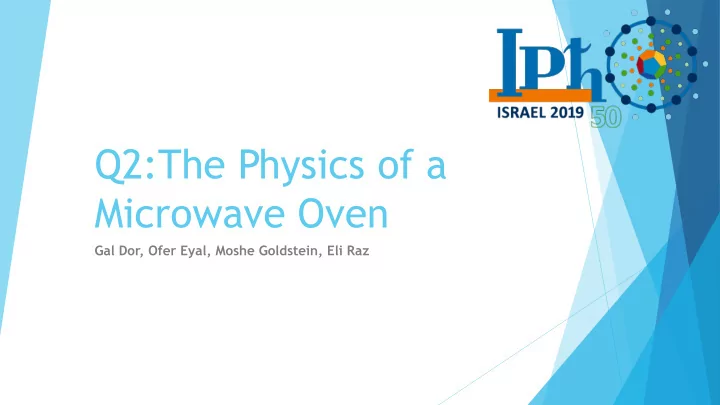

Q2:The Physics of a Microwave Oven Gal Dor, Ofer Eyal, Moshe Goldstein, Eli Raz
Youtube Video https://www.youtube.com/watch?v=lVu11WWrNbQ
Goals Part A: Principles of magnetron operation Part B: Dielectric absorption of microwave radiation by water This talk: very quickly go over key ideas … Apologies in advance for quality of animations.
Part A: Magnetron
Magnetron Magnetrons are complex, non-linear systems. Aim: qualitative understanding of the principles of magnetron operation. Electron drift in electric and magnetic fields Focusing of electrons by oscillating cavities Short discussion of magnetron operation.
Magnetron - Components ⨀ + ⨀ ⨀ - ⨀ ⨀ ⨀ ⨀ ⨀ Negatively charged anode, inside cylindrical positively charged cathode Cavities drilled into cathode Strong external magnetic field, along cylinder axis Strong electric field between cathode and anode
Magnetron - Operation Multiple interacting effects: Electrons boil off anode
- - -
Magnetron - Operation Multiple interacting effects: Electrons boil off anode Drift in magnetic and electric fields
-
Magnetron - Operation Multiple interacting effects: Electrons boil off anode Drift in magnetic and electric fields Electrons hit and charge the cavities
- - - -
Magnetron - Operation Multiple interacting effects: Electrons boil off anode Drift in magnetic and electric fields Electrons hit and charge the cavities Cavities produce electric fields, focusing the electrons Spontaneous symmetry breaking
Magnetron - Operation Multiple interacting effects: Electrons boil off anode Drift in magnetic and electric fields Electrons hit and charge the cavities Cavities produce electric fields, focusing the electrons Cavities act as resonators, forcing periodic motion External magnetic field rotates the ensemble
Part B: Absorption of Radiation
Absorption of Microwave Radiation Common misconception: Water heats up in microwave ovens due to absorption lines. Actually, due to dielectric absorption. Not even the best frequency for absorption by water! Water is partially transparent => more even cooking. Aim: Quantitative understanding of dielectric absorption of microwave radiation by water. Dependence of absorption on temperature, salinity
Absorption of Microwave Radiation - Principles Water is treated as ensemble of interacting dipoles. Traveling EM wave rotates dipoles. Interaction between dipoles introduces delay in response. Phase difference produces heat.
Questions?
Recommend
More recommend